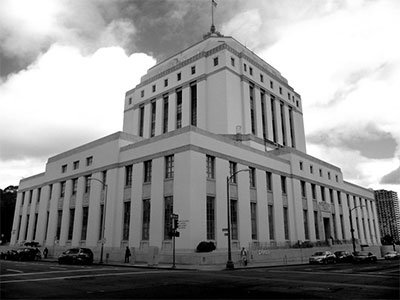 Assume the following factual scenario: a serious car accident occurs, injuring the plaintiff. Just after the accident, the insured defendant called her husband and discussed, in detail, the now highly contested facts of how the incident occurred. During litigation, plaintiff’s counsel notices the deposition of defendant’s husband. Will plaintiff’s counsel be able to elicit, by the husband’s testimony at deposition, the content of the post-accident telephone conversation between him and the defendant, his wife? Such testimony might contain admissions that could be crucial at trial.
Assume the following factual scenario: a serious car accident occurs, injuring the plaintiff. Just after the accident, the insured defendant called her husband and discussed, in detail, the now highly contested facts of how the incident occurred. During litigation, plaintiff’s counsel notices the deposition of defendant’s husband. Will plaintiff’s counsel be able to elicit, by the husband’s testimony at deposition, the content of the post-accident telephone conversation between him and the defendant, his wife? Such testimony might contain admissions that could be crucial at trial.
Generally, the defendant’s lawyer will, under such circumstances, assert representation of her husband, or have an attorney acquaintance do so. The husband’s counsel is likely to refuse to permit him to be called as a witness, or testify at deposition, based on the privileges set out in two statutes. Evidence Code, § 971: “Except as otherwise provided by statute, a married person whose spouse is a party to a proceeding has a privilege not to be called as a witness by an adverse party to that proceeding without the prior express consent of the spouse having the privilege under this section unless the party calling the spouse does so in good faith without knowledge of the marital relationship.” A like privilege (a privilege not to testify) is stated in Evidence Code § 970: “Except as otherwise provided by statute, a married person has a privilege not to testify against his spouse in any proceeding.”
But plaintiff’s counsel will likely assert that such a claim by husband’s counsel fails to take into account the potential applicability of an exception to that statute. Evidence Code § 973 (b) states: “There is no privilege under this article in a civil proceeding brought or defended by a married person for the immediate benefit of his spouse or of himself and his spouse.”
Plaintiff’s counsel will argue this is a case controlled by Evidence Code § 973 (b): as the defendant in the pending action, the wife faces potential liability for the significant damages suffered by the plaintiff. Therefore, the potential deponent husband is also potentially liable for all sums recoverable against the defendant wife. So stating, see Family Code § 910 (“…, the community estate is liable for a debt incurred by either spouse … during marriage”). In accord, see Axis Surplus Ins. Co. v. Reinoso (2012) 208 Cal.App.4th 181, 196 (noting as to a wife’s liability for underlying tort claims made by tenants against her husband: “Linda’s community property interest would be liable for obligations in connection with the property.”)
Examples of Spousal Privilege Related Cases in California
The court in Hand v. Superior Court (1982) 134 Cal.App.3d 436, 442 resolved this same issue (the propriety of a spousal deposition) in the context of statutory analysis of identical language (“immediate benefit”) contained in Code of Civil Procedure § 2019. The Hand court rejected a claim of spousal privilege and found it insufficient to preclude the non-party spouse’s deposition.
-
- “Accordingly, the determination whether community property
- damages are for the ‘immediate benefit’ of the noninjured spouse turns upon the status of the marriage. If, as here, at the time that spousal testimony is sought, the marriage is intact, unliquidated claims for community property personal injury damages are community property in which the noninjured spouse has a present interest and entitlement to a share of the proceeds when recovered. They are for his or her ‘immediate benefit.’ [Citation omitted.] Consequently, the noninjured spouse is subject to deposition by notice upon the plaintiff spouse (Code Civ. Proc., § 2019, subd. (a)(4)) and may not interpose the spousal privilege. (Evid. Code, § 973, subd. (b).)”
There is a factual difference in our hypothetical from the situation in Hand: this action is being “defended by,” rather than brought by, a married person. That is, the wife in our hypothetical is a defendant, not a plaintiff. But, as noted above, Evidence Code § 973 (b) requires exactly the same analysis, irrespective of whether the non-party spouse is sought to be deposed in an action that is brought, or defended, by the party spouse (“There is no privilege under this article in a civil proceeding brought or defended by a married person for the immediate benefit of his spouse or of himself and his spouse.”) (Emphasis added.)
However there is ammunition in the case law which Defendant’s counsel can use to argue in response. It is contained in Duggan v. Superior Court (1981) 127 Cal.App.3d 267, 270-272. That case held that an “immediate benefit” waiver of the spousal privilege against testifying is triggered only if the married person would obtain a benefit from his or her spouse’s litigation because of a right which the married person holds directly, and not simply because of a potential community property interest in any recovery that the spouse might obtain.
In Duggan, the husband, a partner in a real estate venture, sued to establish a 15% ownership interest in certain parcels of real property acquired on behalf of the partnership, which were held of record by defendants. Despite his wife’s potential community property interest in any recovery the husband might obtain, the court held the suit was not being prosecuted for her “immediate benefit” so as to trigger a § 973(b) waiver of her testimonial privileges. She was, the court said, not a party to the action, nor was she a signatory to the partnership agreement, nor a record holder of any property involved in the suit; nor, the court noted, did she by law possess a community property claim to specific partnership property (citing to Corporations Code § 15025(2)(e)). Therefore, the Duggan court held: “Any claim to a community property interest in the partnership would be against [Husband]…, and under the showing made here, the action is not being prosecuted for the immediate benefit of the person whose deposition is sought.” Id. at 272. The court therefore concluded that compelling the wife’s deposition would violate her Evidence Code §§ 970 and 971 privileges.
Another authority on this issue, Sabado v. Moraga (1987) 189 Cal.App.3d 1, 9–10, offers little guidance to either side: it expressly leaves undecided whether a spouse’s suit seeking damages for violation of the Civil Rights Act would trigger § 973’s “immediate benefit” waiver.
Counsel should also consider whether a final factual variable might be of any analytical consequence: does it matter if the loss is insured; and, if it is, does it matter if the defendant has potential financial exposure beyond the policy limits? This factual variation has not been discussed in any applicable case law. The husband could certainly argue that if he is truly not exposed to loss by the claim because (for example) a statutory settlement demand does not exceed his policy limits, the exception to spousal privilege set out in Evidence Code § 973 should not apply.
Final Word
In summary, there is fodder in the case law for each side’s argument in this dispute, and both parties should be able to present a forceful position. Two competing principles are at stake: the statutory right of discovery, and the judicial use of privilege to protect the confidentiality of a marital relationship. Only further development of the case law will determine which interest is likely to prevail in any given dispute.
Photo credit: https://www.flickr.com/photos/joebehr/4974829254/

